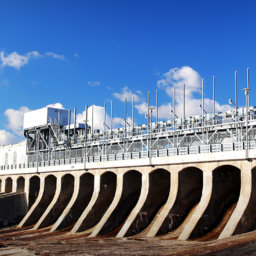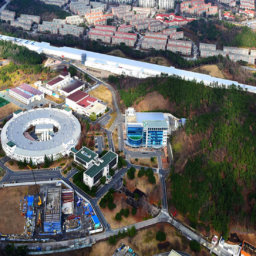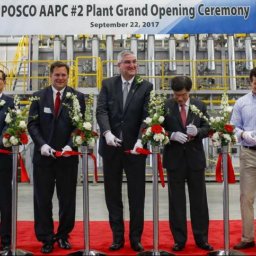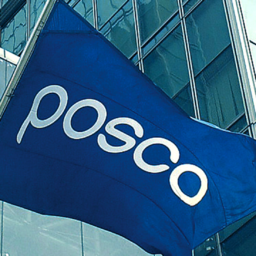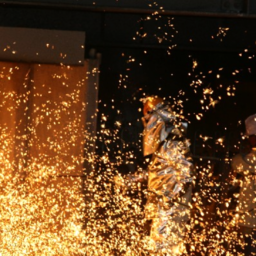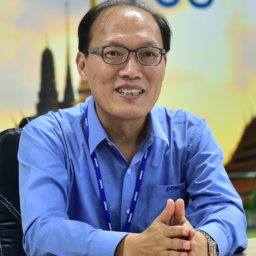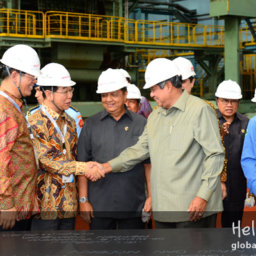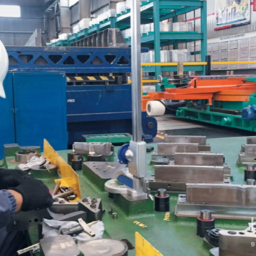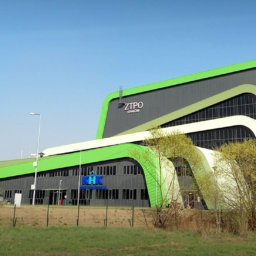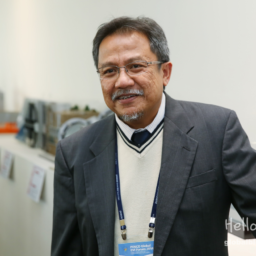Nobody thought it would be possible for postwar Korea to construct integrated steelworks on its devastated land. However, as we all know, POSCO played a major role in rebuilding the nation through the undying mind of challenge and calling towards steelmaking patriotism. It’s been 45 years since Pohang Iron & Steel Co., Ltd., a former name for POSCO, was established. Up to this day, POSCO’s 45 years long operation has been sharing the sympathy of Korea’s history. ‘Hello, POSCO’ decided to introduce history of the world’s leading steel-making company in four parts; Establishment, Construction of Pohang Steelworks, Construction of Gwangyang Steelworks and After Completing the History.
[Establishment]
POSCO on the basis of ‘Steelmaking Patriotism’
After the Korean War between 1950 and 1953, Korea was under severe damages in terms of its people, land and economy. The new community movement, or so-called Saemaeul Movement, from the late 60s embarked upon reconstruction of the nation to overcome poverty and economic difficulties. The 2nd Five-Year Economic Development Plan was introduced in 1967 and one of the top priorities was to build an integrated steelworks. Korea had neither capital nor technology to accomplish the mission but the challenge continued.

In 1965, then-President Park Chung-hee visited the U.S. and met President Poy of Koppers to discuss the construction of integrated steelworks. After the meeting, the plan became feasible and the Korea International Steel Association (KISA) was founded with seven companies from the U.S., the U.K., West Germany and Italy. Three years later, Pohang Iron & Steel Co., Ltd, was established.

[Construction of Pohang Steelworks]
Building a steelworks on a wild terrain of Young-il Bay
Geographically, Korea is not a perfect place to build steelworks. But it didn’t halt POSCO’s challenging and innovative spirit, which are still POSCO’s principles, from deciding Young-il Bay in Pohang as the home of integrated steelworks.

In April, 1970, the whole nation watched the groundbreaking ceremony with bated breath. With the roar of blasting powder, the construction of Pohang Steelworks, which will go down in history of Korea and its economy, began.

When the furnace first poured down molten metal into a cast, Park Tae-joon, the Founder and President of POSCO, and every personnel on the site cried out hoorays during the overwhelming moment.

The construction process was undertaken through four phases over 13 years of period. In 1983, it recorded annual crude-steel capacity of 9.1 million tons.
[Construction of Gwangyang Steelworks]
‘The Steelworks of Dream’ built on the sea
In 1970, sluggish global economy affected developed countries to cut down their steel productions. However, demands for steel soared in Korea given its economic development plans. Domestic companies started planning to construct the second steelworks.

Amid its rivals, POSCO, with the experience and technology the firm acquired from building the first steel work in Pohang, reclaimed the land from the sea and built Gwangyang Steelworks. The facility was designed with cutting-edge technologies such as automation and computerization of all the processes. It was indeed ‘the Steelworks of Dream’, aiming at the 21st century’s new environment.
[After Completing the History]
POSCO’s challenge to become the global leader continues.
After accomplishing the construction for annual crude-steel capacity of 20.8 million tons, POSCO lays the foundation stone of globalized operation by being listed on the New York Stock Exchange, for the first time as a Korean corporation in 1994. In December 1995, the company opens POSCO Center in Daechi-dong, Seoul and marks the beginning of yet other proud history for POSCO.

After tirelessly marching forward for prosperity of Korea and its economy, POSCO then enters into a new era. In order to enhance the organization’s specialty and efficiency, POSCO introduces a management commission and outside directorships. The moves later serve as a momentum of concreting POSCO’s advanced management system. Following the privatization in 2000, the company changes its name from Pohang Iron & Steel Co,. Ltd. to POSCO Co., Ltd. as we call it nowadays.
Since then, POSCO has continuously received the honors such as being named as one of the top corporations in Dow Jones Sustainability Indexes for 8 consecutive years. POSCO was also awarded as the most respected Korean company in 2012. As you can see, POSCO’s mission to create greater outcomes is on its course, not only in domestic market but at global level.

Notably, CSR activities in relation with regional communities and supports for multicultural families have been recognized with a great deal of attentions towards POSCO, the ‘beloved’ company. On the strength of development in brand value, POSCO was selected as the ‘the Most Respected Korean Company for 10 Consecutive Years’. The award illustrates POSCO’s overall management innovation in terms of enhancing the corporate’s image amongst the public. POSCO is also continuing its highly profitable earnings rate, highest in the field globally. According to an internationally renowned steel-making industry analysis agency, POSCO has been the world’s most competitive steel company for the past four years, ensuring its firm position as one of the global leaders.

Furthermore, amid the slumping financial performances of numerous steel making companies under sluggish global economy in last year, POSCO manufactured 37.99 million tons and sold 35.05 million tons of crude steel. Not only that, POSCO posted KRW 63.6 trillion in turnover and KRW 3.65 trillion operating profits. The operating profit of 7.8% rate is the highest figure in the industry and POSCO was capable of accomplishing the result through expanding the sales of high value-added products and cost reduction. With these successes, POSCO is successfully forwarding its medium-and long-term investment plans for future growth.
Keeping the pace with the Chief Executive Officer Chung Joon-yang’s declaration of management innovation last year, POSCO is planning to emphasize quality of development on the basis of profitability. By 2015, POSCO aims to increase the company’s capability of manufacturing crude steels up to 48 million tons globally as well as raising the capacity of domestic and overseas generation units to 4,474MW. In materials, POSCO is targeting to reach the KRW 8.2 trillion goal in sales to build a portfolio with profitability and growth for the future.
As we have witnessed, POSCO is an icon of Korea’s growth industry and driving force. Aside from the success of becoming the world’s most competitive steel manufacturer, POSCO will not be complacent and keep walking its own path as a major global corporation. So we ask for your continued support.
[box]

December, 1965 – the Korea International Steel Association established
July, 1967 – City of Pohang selected as location for integrated steelworks
April, 1968 – Pohang Iron & Steel Co., Ltd. established
April, 1970 – Construction of Pohang Works Phase 1 begun
February, 1981 – Construction of Pohang Works Phase 4 completed (annual crude-steel capacity: 8.5 million tons)
March, 1985 – Construction of Gwangyang Steelworks Phase 1 begun
December, 1986 – POSTECH opened
October, 1992 – Integrated construction completed in time to celebrate a Quarter-century of Pohang Iron and Steel Co., Ltd. (annual crude-steel capacity: 20.8 million tons.)
December, 1995 – POSCO Center opens in Seoul
October, 2000 – Privatization completed
March, 2002 – Company name changed to POSCO Co,. Ltd.
May, 2012 – POSCO selected as the most respected Korean company
[/box]



